

Most ebook files are in PDF format, so you can easily read them using various software such as Foxit Reader or directly on the Google Chrome browser.
Some ebook files are released by publishers in other formats such as .awz, .mobi, .epub, .fb2, etc. You may need to install specific software to read these formats on mobile/PC, such as Calibre.
Please read the tutorial at this link: https://ebookbell.com/faq
We offer FREE conversion to the popular formats you request; however, this may take some time. Therefore, right after payment, please email us, and we will try to provide the service as quickly as possible.
For some exceptional file formats or broken links (if any), please refrain from opening any disputes. Instead, email us first, and we will try to assist within a maximum of 6 hours.
EbookBell Team

4.3
38 reviews"Beyond the Anti-group: survival and transformation" builds on the success of Morris Nitsun's influential concept of the Anti-group, taking it into new domains of thought and practice in the current century. The concept focuses on anxiety and hostility within, towards and between groups, as well as the destructive potential of groups. In Beyond the Anti-group". Morris Nitsun continues his inquiry into the clinical implications of the anti-group but also explores the concept beyond the consulting room, in settings as wide-ranging as cultural and environmental stress in the 21st century, the fate of public health services and the themes of contemporary art.
Groups are potentially destructive but also have the capacity for survival, creativity and transformation. Focusing on the interplay between the two, Morris Nitsun explores the struggle to overcome group impasse and dysfunction and to emerge stronger. By tracking this process in a range of cultural settings, the author weaves a rich tapestry in which group psychotherapy, organizational process and the arts come together in unexpected and novel ways. The author draws on group analysis and the Foulkesian tradition as his overall discipline but within a critical frame that questions the relevance of the approach in a changing world, highlighting new directions and opportunities.
Readers of Beyond the Anti-group: Survival and Transformation will be stimulated by the depth, breadth and creativity of the author’s analysis and by the excursion into new fields of inquiry. The book offers new impetus for psychotherapists, group analysts and group practitioners in general, students of group and organizational processes, and those working on the boundary between psychotherapy and the arts.